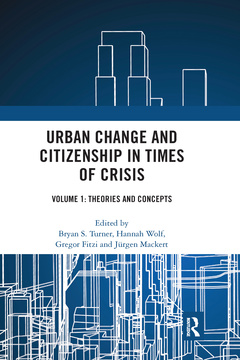Urban Change and Citizenship in Times of Crisis Volume 1: Theories and Concepts
Coordonnateurs : Turner Bryan S., Wolf Hannah, Fitzi Gregor, Mackert Jürgen

Urban Change and Citizenship in Times of Crisis addresses the fact that in the beginning of the twenty-first century the majority of the world?s population is urbanised, a social fact that has turned cities more than ever into focal sites of social change. Multiple economic and political strategies, employed by a variety of individual and collective actors, on a number of scales, constitute cities as contested spaces that hold opportunities as well as restrictions for their inhabitants. While cities and urban spaces have long been of central concern for the social sciences, today, classical sociological questions about the city acquire new meaning: Can cities be spaces of emancipation, or does life in the modern city entail a corrosion of citizenship rights? Is the city the focus of societal transformation processes, or do urban environments lose importance in shaping social reality and economic relationships? Furthermore, new questions urgently need to be asked: What is the impact of different historical phenomena such as neo-liberal restructuring, financial and economic crises, or migration flows, as well as their respective counter-movements, on the structure of contemporary cities and on the citizenship rights of city inhabitants? The three volumes address such crucial questions thereby opening up new spaces of debate on both the city and new developments of urbanism.
The contributions to Theories and Concepts offer new theoretical reflections on the city in a philosophical and historical perspective as well as fresh empirical analyses of social life in urban contexts. Chapters not only critically revisit classical and modern philosophical considerations about the nature of cities but no less discuss normative philosophical reflections of urban life and the role of religion in historical processes of the emergence of cities. Composed around the question whether there can be such a thing as a ?successful city?, this volume addresses issues of urban political subjectivities by considering the city?s role in historical processes of emancipation, the fight for citizenship rights, and today?s challenges and opportunities with regard to promoting social justice, integration, and diversity. Consequentially, theory-driven empirical analyses offer new insight into ways of solving problems in urban contexts and a genuine approach to analyse the Social Quality in cities.
Introduction: Cities between Success and Failure Part 1: Philosophical and Historical Trajectories 1. The Good City and Its True Costs: Planetary Urbanisation Through an Aristotelian Lens 2. Sacred Cities: Ancient and Early Modern Religious Diversity 3. On Immigration and the Meanings of Urban Social Justice in Queens, NY 4. Successful Societies and Policy Discourse: A Meta-Political Engagement with Joan C. Williams’s White Working Class Part 2: Urban Political Collectivities 5. Global Urbanism and the Crisis of Emancipation 6. Changing Political Collectivities in Times of Crisis: Tenant Protest in Berlin and New York 7. Urban Citizenship in Times of Gentrification Part 3: Towards Urban Complexity and Social Quality 8. Urban Complexity and Urban Change : Co-Irritation, Co-Evolution and Co-Design with the Potsdam Lodestar Approach 9. ‘Social Quality’ and the City : A Qualitative Exploratory Comparison in the Cities of Lausanne and Zurich
Bryan S. Turner is Professor of Sociology and Director of the Institute for Religion Politics and Society at the Australian Catholic University, Honorary Professor and Director of the Centre for Citizenship, Social Pluralism and Religious Diversity at Potsdam University, Germany, and Emeritus Professor at the Graduate Center at the City University of New York City. He is the founding editor of the Journal of Classical Sociology. He edited the Blackwell Wiley Encyclopedia for Social Theory (2018). He was awarded a Doctor of Letters by Cambridge University in 2009 and received the Max Planck Award in social science in 2015.
Hannah Wolf is a researcher and lecturer completing her PhD at the University of Potsdam, coordinator of the Centre for Citizenship, Social Pluralism and Religious Diversity and associate member at the collaborative DFG-research centre Re-Figuration of Spaces (TU Berlin). Her academic background includes theatre and media studies, anthropology, philosophy and sociology. Her research interests lie in the political and moral economies of housing and home, citizenship, urban sociology and the sociology of everyday life.
Gregor Fitzi is co-director of the Centre for Citizenship, Social Pluralism and Religious Diversity at University of Potsdam, Germany. After his PhD in Sociology at the University of Bielefeld, he was Assistant Professor at the Institute of Sociology, University of Heidelberg, Germany. Among his recent publications are The Challenge of Modernity. Simmel’s Sociological Theory (Routledge, 2019) and Populism and the Crisis of Democracy, 3 vols, edited with Jürgen Mackert and Bryan S. Turner (Routledge, 2019).
Jürgen Mackert is Professor of Sociology and a co-director of the Centre for Citizenship, Social Pluralism and Religious Pluralism at the University of Potsdam, Germany. His research interests lie in the sociology of citizenship, political economy, closure theory, (neo-)liberal
Date de parution : 12-2021
15.6x23.4 cm
Date de parution : 03-2020
15.6x23.4 cm
Mots-clés :
Good Life; Dense; successful; Precarious Prosperity; cities; Contemporary Societies; crisis; Community Land Trust; crises; West Germany; citizenship; Violate; concepts; Tenant Movement; theory; Civil Society; sociology; White Working Class; urban studies; Yankees; politics; Unlimited; big cities; Neo-liberal Urbanism; social life; Follow; violence; Neoliberal Urbanism; communication structures; Tenant Protest; migration; Planetary Urbanisation; emancipation; Urban Social Justice; inter-ethnic relations; Sacred Cities; climate change; Gated Communities; climate crisis; Williams’s Arguments; commodification; Political Collectivity; citizenship regimes; Global Urbanism; SST; neoliberalism; Good City; social justice; geography; social reality; economic relationships; urban change; citizenship rights; societal transformation



